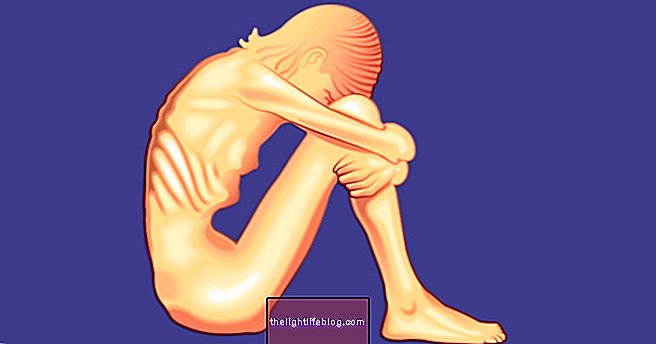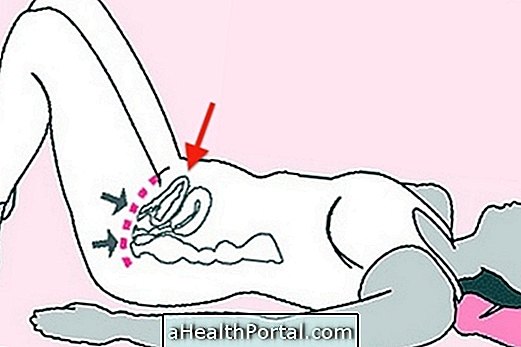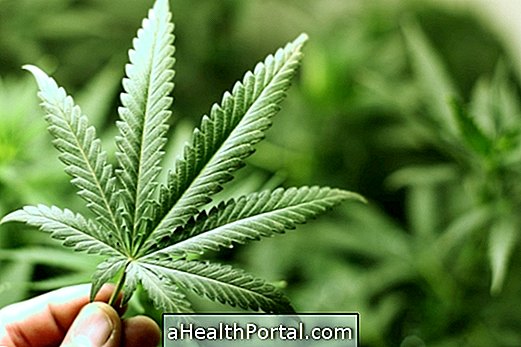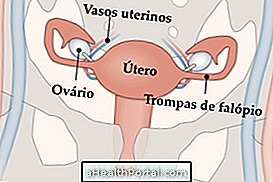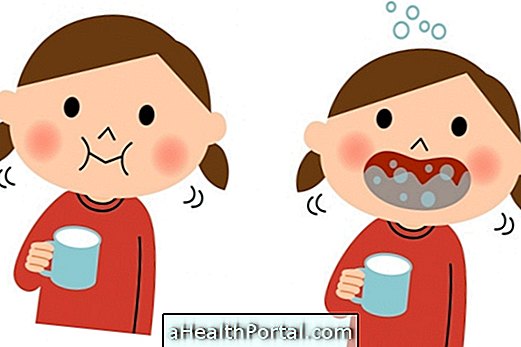The complications of bulimia are related to the compensatory behaviors presented by the person, that is, the attitudes they take after eating, such as forced vomiting, because inducing vomiting, in addition to expelling food, it also expels the acid present in the body. stomach, causing injuries, sores and irritations in the throat and esophagus.
In addition, the frequent use of laxatives can also be related to complications, since it can promote dehydration and gastrointestinal inflammations.
Bulimia is an eating and psychological disorder characterized by binge eating followed by compensatory behavior in order to eliminate what was consumed and prevent weight gain. Understand what bulimia is and how to identify symptoms.

Thus, the main complications related to this eating disorder are:
1. Reflux and wounds in the esophagus
Reflux appears due to repeated induction of vomiting, which weakens the lower esophageal sphincter, which is the structure responsible for preventing the stomach contents from returning to the esophagus. In addition, the fact of forcing vomiting and always having acid content in the esophagus favors the formation of ulcers, which can be quite uncomfortable. Due to the fact that vomiting is frequent in bulimia, the healing of these ulcers takes time, further aggravating the pain and discomfort felt.
What to do: In addition to psychological and nutritional guidance, it is important that the person goes to the gastroenterologist to recommend the use of drugs that decrease stomach acidity, such as Omeprazole and Plasil. In addition, avoiding drinking fluids during meals and using home remedies such as ginger tea are also measures that help control reflux. Learn more about reflux treatment.
2. Dehydration
Dehydration is also possible as a consequence of bulimia, often resulting from frequent vomiting and use of laxative and diuretic medications, causing the body to lose a lot of water and minerals such as potassium, which are important for blood balance and for the functioning of the muscles and kidneys.
What to do: It is important to drink at least 2 liters of water a day and give preference to liquids containing vitamins and minerals, such as natural fruit juices, coconut water and isotonic drinks.
3. Swelling on the cheeks
The swelling in the mouth and chin is usually linked to the enlargement of the parotid glands, which are a type of salivary glands that end up growing according to the number of times the vomiting is caused.
What to do: To reduce swelling, it is necessary to treat bulimia, normalize the acidity of the blood and mouth, and avoid vomiting, as this way the gland stops being over-stimulated and returns to its normal size.
4. Deterioration of teeth
It is common in bulimia to make the mouth, tongue and throat dry and painful, in addition to increasing the risk of cavities and tooth sensitivity, which also end up being deformed in the most severe and prolonged cases of the disease, mainly due to the induction of vomiting, favoring the frequent presence of acid content in the mouth.
What to do: To treat, you should rinse your mouth with baking soda after episodes of vomiting, and see a dentist who will treat cavities and other diseases in your mouth, and prescribe mouthwashes or fluorine-based gels, or, even recommend using a device that protects your teeth when vomiting.
In addition, it is important to drink plenty of water to keep your mouth hydrated and to avoid brushing your teeth right after vomiting, as this worsens the corrosion of your tooth enamel.
5. Chronic constipation
Laxatives are used with the aim of promoting intestinal contraction and facilitating the elimination of feces, however its constant and frequent use, as in bulimia, can make the intestine dependent on this type of medication, resulting in constipation. Thus, one of the complications of bulimia is chronic constipation, making it difficult for a person to evacuate without the help of the medication. Learn more about the health risks of laxatives.
What to do: In these cases, it is important to speak with the doctor to assess the severity of the problem, as in some cases it is necessary to take medication or have surgery to correct changes in the intestine. In addition, you should eat a diet rich in fiber, legumes, vegetables and seeds, and drink plenty of water to facilitate intestinal transit, preferably under the guidance of a nutritionist to avoid complications.
See in the video below what to eat to fight constipation:

6. Absence of menstruation
As in bulimia there is a loss of important nutrients for the functioning of the organism and, therefore, in the case of women, changes in the menstrual cycle or the absence of menstruation may be perceived due to the lack of nutrients responsible for the regulation of hormones related to the reproductive system of women.
What to do: For the woman's menstrual cycles to be regular again, it is important that the woman has a normal and adequate diet again, preferably under nutritional guidance. Thus, when the woman returns to eating normally and being well nourished, the production of hormones returns to normal, reactivating the menstrual cycle.
7. Depression and mood swings
Changes in mood and depression are common in patients with bulimia and are problems that must be treated with medical monitoring, which may prescribe antidepressant medications, in addition to psychotherapy, which aims to help the patient to improve his self-esteem and have a new one. attitude towards food.
At this point, it is important that the patient receives the support of family and friends to overcome the psychological disorders brought about by the disease, and its participation and encouragement to treatment is important.
8. Insomnia
Insomnia results mainly from mood swings, hormonal changes and constant concern with weight and diet.
What to do: To improve sleep, you can use medications prescribed by your doctor and take soothing teas at night, such as lemon balm and valerian teas. In addition, it is important to have a routine to wake up and sleep, avoid taking naps during the day and avoid drinking caffeinated drinks after 5 pm, such as coffee and cola soft drinks.
Check out other tips to get better sleep by watching the following video:

Was this information helpful?
Yes No
Your opinion is important! Write here how we can improve our text:
Any questions? Click here to be answered.
Email in which you want to receive a reply:
Check the confirmation email we sent you.
Your name:
Reason for visit:
--- Choose your reason --- DiseaseLive betterHelp another personGain knowledge
Are you a health professional?
NoMedicalPharmaceuticalsNurseNutritionistBiomedicalPhysiotherapistBeauticianOther
Bibliography
- NATIONAL EATING DISORDERS COLLABORATION. Nervous bulimia. Available in: . Accessed on Dec 09, 2019


